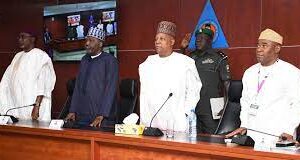The world on Monday, May 27, 2019, once again celebrated Children’s Day with fun and fanfare. SAMSON BENJAMIN in this report examines the worrisome plight of out-of school children in Nigeria against the backdrop of their right to education in the nation’s laws.
Eleven-year-old Ababukar Sani left Sokoto state to Nasarawa state at the age of seven. Sani was taken to Mararaba in Karu local government area of Nasarawa state alongside several other children within the same age bracket by one Haliru Usman. Sani who begs in company of other children has no knowledge of who his biological parents were because he was abandoned as a child.
Although Sani like every other child, would like to go through a formal education; unfortunately, there is nobody to see him through school.
He told Blueprint Weekend that, “If I have the opportunity, I would love to go through a formal education to enable me to take care of myself and the people around me.”
Like Sani, there are over 13 million out-of-school children in Nigeria, the majority of who are from the northern part of the country.
Shame of a nation
The former minister of Education, Malam Adamu adamu, had in 2018 at the opening of the 52nd National Council of Education meeting in Kano, stated that the number of out-of-school children in Nigeria was 10.5 million. This, he said, represented more than 50 per cent of the world’s out-of-school children which was 20 million.
Unfortunately, that figure has increased rather dramatically. Last week, the executive secretary of the Universal Education Commission (UBEC), Dr. Hammid Bobboyi, stated at a United Nations Children’s Education Fund (UNICEF) forum that the number of school-age children who are not in school in Nigeria is now 13.2 million.
Similarly, Adamu, in an emotion-laden speech during a valedictory session at the ministry’s headquarters in Abuja, last week, said the menace has been embarrassing.
He also apologised to Nigerians over his inability to keep to his promise to reduce the number of out-of-school children by half before the end of his tenure.
The minister said the uninspiring status of Nigeria parading the highest number of out-of-school children globally was a big mark of shame to him as a person and to the entire country.
“When I attend conferences outside the country and the issue of out-of-school children is being discussed, I feel embarrassed. It is a big mark of shame to me as a person and to us as a nation. Nigeria is the highest even though we are not known for poverty.
“We promised to reduce to reduce out-of-school children by half. I must apologise, we have failed in that. I am hoping that the next minister will address it,” he said.
Right to education
In Nigeria, children’s right to education is protected by law under the Child Rights Act of 2003, Universal Basic Education Act of 2004 among others. These laws among other things guarantee compulsory basic education for children in Nigeria.
According to a child rights activist and secretary-general of the Child Protection Network, Barrister Taiwo Akinlami, ”Prior to the 2003 Child Rights Act, Nigerian child protection was defined by the Children and Young People’s Act (CYPA), a law relating primarily to juvenile justice. However, in 2003, Nigeria adopted the Child Rights Act to domesticate the Convention on the Rights of the Child.”
However, it is unfortunate about 16 years since Nigeria adopted the Child Rights Act, eleven states mostly in the North have not domesticated the Act. The states are Kano, Sokoto, Kaduna, Kebbi, Jigawa, and Adamawa. Others yet to pass the law are Bauchi, Yobe, Borno, Zamfara, Gombe, and Katsina.
Experts speak
In a chat with Blueprint Weekend, the Child Protection Specialist, United Nations Children’s Emergency Fund (UNICEF), Sharon Oladiji, said some of the setbacks on the passage of the law include religion and cultural beliefs which are inherent in these states.
She said, “The Convention on the Rights of the Child (CRC) was adopted by the General Assembly of the United Nations by its resolution of November 20, 1989.
“The convention which spells out same meaning for every child around the world took into consideration, cultural, social economic and political differences and realities of individual states. The convention also made provision for each state to seek its own means to implement the rights equal and common to all.”
Further calling on government at all levels to put laws in place to protect the rights of children in Nigeria, Oladiji said such action by the state would encourage implementation of the law with children and the Nigerian economy being the highest beneficiaries.
“While we try to bring the rights of children to the knowledge of the public, we also encourage these children on the need to know their rights. Adults, teachers and parents need to know why they must adhere to CRL.
“Children are individual human beings totally dependent on adults. So, as adults, we must be responsible for how they are treated. Healthy development of a child is crucial to the future and well-being of any nation.
“Children are special, we cannot treat them anyhow. Views of children are rarely heard, but we should continue to make efforts to change this,” Oladiji said.
North’s concerns
Similarly, lamenting the huge number of out-of-school in northern Nigeria to Blueprint Weekend, a presidential candidate on the platform of Abundant Nigeria Renewal Party (ANRP) in the 2019 general election, Mr Tope Fasua said, “Despite the passage of both the Child Rights Act , 2003 and the Universal Basic Education (UBE) Act 2004, making the first nine years of a child’s education, primary and junior secondary school as a basic right of children, access to basic education remained elusive to millions of Nigerian children.”
Fasua said within the huge number of out-of-school children in the country, girls are in the majority, especially in northern Nigeria.
He said: “During the 2019 campaign period I did a lot of research on the education sector in Nigeria and I travelled to all the 36 states of Nigeria, including the North. I saw things for myself, I tell you based on what I saw, and Nigeria is in a big mess as far as the education is concerned. Come to think of it, the latest data shows that there are 13 million children out-of-school in Nigeria, and 69 per cent are in northern states.
“North-east has the largest number of out-of-school children followed by the North-west. With this number, Nigeria accounts for more than one in five out-of-school child globally, and 45 per cent of out-of-school children in West Africa. Within the huge number of out-of-school children, girls are in the majority especially in northern Nigeria.
“The security threats to schools by Boko Haram and bandits in the North-east as well as other parts of Nigeria have contributed significantly to the low demand for and access to education especially for girls.”
Continuing, he said, “The reality is that children are missing education in Nigeria and a lot of them are coming from northern Nigeria and that is why serious interventions are needed more in the region because education is a right.
“The right to education is a right of every human being, from childhood until the end of life, without discrimination under any grounds.
“Child rights are fundamental freedoms and the inherent rights of all human beings below the age of 18. These rights apply to every child, irrespective of the child’s, parent’s/legal guardian’s race, colour, sex, creed or other status. One of these rights is the right to ‘education and access to appropriate information.”
The Almajiri schools
Sadly, Blueprint Weekend’s investigations revealed that the majority of the Almajiri integrated model schools built during the tenure of former President Goodluck Jonathan have deteriorated or converted to conventional schools by some northern states governors.
The schools were built in order to tackle the high rate of illiteracy rate in the northern region.
Former President Goodluck Jonathan launched the programme on April 10, 2012, at Gagi in Sokoto state, where he registered 25 pupils in the new model boarding school, equipped with modern facilities.
It was the first of 400 such schools to be built in the northern states for which the government had planned to spend about N15 billion.
Jonathan said the first model school would have facilities such as language laboratory, recitation hall, classrooms, dormitories, clinic, vocational workshop, dining hall and quarters for teachers.
However, seven years after, our findings reveal that some of the schools have been converted to conventional schools while others are replete with decaying facilities.
In Zamfara state, a former state commissioner for education, Alhaji Muktar Lugga, told our correspondent that, “When we came on board, we took over the Almajiri schools and converted them into conventional schools and even when we did that we encapsulated the objectives for which the schools were established because nothing has been done outside the original plans,” he said.
Also, in Kaduna Daily Trust reported that Almajiri schools in Kaduna are characterised by lack of facilities just as bed bugs have taken over the majority of the schools in the state.
They observed that all the schools experience shortage of teachers and classrooms and also lack facilities such as laboratory, clinic, dining hall, dormitory, and writing materials. The schools are also lagging behind as far as hygiene and sanitation is concerned.
Unfortunately, the story is not different in other states.
Enforceable right
The executive-director, Socio-Economic and Accountability Project SERAP), Adetokunbo Mumuni, in an interview with Channels Television on Monday, May 27, 2019, said the right to education is an enforceable right in the court of law in Nigeria. According to him, “Some years back, specifically November 2010, SERAP obtained a landmark decision from the ECOWAS Court of Justice in Abuja declaring that the right to education is a legally enforceable human right in Nigeria.”
Similarly, in 2017, Federal High Court in Abuja declared free and compulsory basic education up to Junior Secondary School as an enforceable right for every Nigerian child.
Delivering judgement in a suit filed by a civil society group, the Legal Defence and Assistance Project, Justice John Tosho declared that federal and state governments had constitutional duties to provide adequate funding for the free education scheme.
The court held that failure of any government at both the state and federal levels to fund the scheme would constitute a breach of the Constitution of the Federal Republic of Nigeria.
The court noted that ordinarily, the right to free education in Section 18(3) (a) of the Constitution was not enforceable like all other rights provided for in the Chapter 2 of the Constitution.
But the judge held that the Compulsory, Free Universal Basic Education Act of 2004, enacted by the National Assembly, had elevated the right to an enforceable status.
Senate to the rescue?
The Senate recently frowned upon model of Almajiri Islamic education system being operated in most parts of the Northern states in Nigeria leading to non-embracement of western education by many of the knowledge seekers within the system.
It, therefore, called for full compliance of provisions of the Universal Basic Education Act, 2004, which made formal education compulsory for school age children from Basic one to nine.
In doing that, the upper legislative chamber directed relevant authorities to apply the laws as contained in Sections 2 to 5 of the Act against any school age child or his or her parents if found roaming the streets during school hours.
The Senate’s directives in this regard were sequel to a motion moved to that effect by the Senate Leader, Ahmad Lawan (APC, Yobe North).
Lawan, who moved the motion in commemoration of Children’s Day, celebrated on Monday, May 27, this year, said at least 14 million children are out of school in Nigeria, the majority of whom are knowledge seekers under the Almajiri system.
Security concerns
According to him, the 14 million out-of-school children are potential sources of insecurity for the country in future.
“If drastic actions are not taken by relevant authorities to stem the tide of increased number of out of school children in the country, their population will be more burdensome on the Nigerian state and its economy in the nearest future with attendant serious security problems as already being experienced in some parts of the country.
“We must be brave and courageous enough in finding the way out by reforming the Almajiri system of Qur’anic education in a way that formal or western education should be factored into it.
“If this 8th National Assembly cannot achieve this, the 9th National Assembly should ensure that relevant provisions in the Universal Basic Education Act 2004 are implemented to the letter across the states as regards, free and compulsory education for school age children in Nigeria.”
“Relevant provisions of the Act must be applied against defaulters be it, school age children refusing to go to school or their parents encouraging such backward behaviour,” he said.
FG concerned
Speaking with Blueprint Weekend, Zainab Alkali, a professor of Vocational Education, University of Jos, and a consultant to the Universal Basic Education Commission (UBEC), said the federal government has over the years shown commitment to the improvement of basic education since return to civil rule in 1999, particularly through instituting the UBEC.
She said: “The Universal Basic Education programme, backed up by the UBE Act of 2004, is a special intervention of the government, which improved on the former National Primary Education operated from the 1970s till early 2000.
“The mandate included achieving Education for All, reducing the rate of school dropouts and out-of-school children; improving quality and efficiency of basic education, as well as promoting the acquisition of literacy, numeracy, life skills and values for life-long education and useful living.
“The federal government, in order to achieve these aims, through the Basic Education programme declared education from primary to junior secondary school free and compulsory, and a fundamental right of all school-age pupils.
“The UBE Act provides the 36 states of the federation and the Federal Capital Territory with intervention funds, which can be accessed upon meeting certain conditions. The conditions to be met include providing a 50 per cent counterpart funding to match FG’s own contribution.
“Unfortunately, many states are unable to meet up with the conditions for accessing these funds and education consequently suffers lack and setback in their respective states.
“While Basic Education administrators complain of paucity of funds, the federal government’s matching grants remain at the Central Bank of Nigeria waiting to be accessed for the development of the same, throughout the country. These, no doubt, are tales of woe; elucidating an experience of the proverbial butcher’s son who suffers lack of meat and thus settles for the worst of the bones.
“It is a situation of suffering in the midst of plenty and putting up with rags amidst an avalanche of gorgeous clothes,” she said.
Also, Blueprint Weekend’s investigation shows that as of March, 2017, according to information published on UBEC’s website, over N 59 billion (exactly N 59, 744 , 722, 935. 10) remain un-accessed by the states in UBEC funds, with states such as Delta, Ebonyi, Ekiti and Niger having left-over funds from as far back as 2011 – 2012.
UBEC’s panacea
The Universal Basic Education Commission (UBEC) in partnership with the Commonwealth of Learning, Canada, is set to adopt Open Schooling Programme as a strategy to reduce the number of out-of-school children in the country.
UBEC’s executive secretary, Dr Hamid Bobboyi, stated this on the sidelines of a two-day Committee Meeting on Open Schooling Programme in Nigeria in Abuja, on Thursday, this week.
He said, “It is for this reason we thought we needed to explore a kind of strategy that can help us meet the needs of Nigerian children wherever they are and for whatever reason they are not going to school.
“One of those things that have worked in different parts of the world has been the issue of open schooling, innovative open schooling, not the one where you have people just sending text materials.
“We call it innovative because it is IT-based; you have the kind of facilities that can enable you to without internet connectivity draw a lot of resources on to certain gadgets.
“This can then help you disseminate this information and help access those students and pupils attending and registered at these centres.
“For instance children who have to go to the farm or herders who have to tend cattle in the mornings will have those facilities that will meet their educational needs when they return in the afternoon.”



